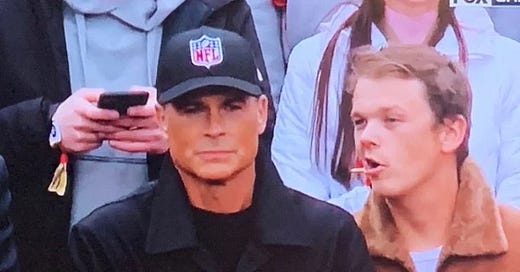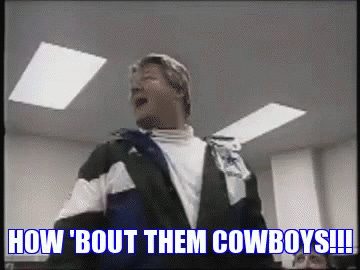It’s September, which means NFL football is back and about damn time. A new season means a clean slate: whether that’s a new coach, a new crop of players, or just wiping away the stink from a weird 2020 season. If last week’s raucous college football start is any indication, we’re in for a good year. Can’t wait for crisp fall air, tailgates, and grown men in jerseys fist fighting each other in the stands.
While going to live sporting events is objectively awesome (especially after last year), let’s just be honest: the in-person NFL experience pales in comparison to watching it at home on an 80-inch, crystal clear flatscreen.
And the NFL recognizes this, inking a $113 billion media rights deal in the off-season. The deal represents an 80% increase in value over the previous one, which now includes streaming with Amazon. That matters because the 32 NFL franchises share the revenue generated by these broadcasts, which, in turn, increases the value of each franchise. A rising tide lifts all ships.
Hell, the inept New York Jets are worth an estimated $4 billion despite offering some of the worst football in the league, buoyed by the best media market in the country. This begs the question, then: do wins matter to franchise value?
Short answer: yes. There’s a basket of teams that routinely compete for the Super Bowl as well as a basket of teams that routinely compete for the first pick in the draft. Those Top-5 teams – the Patriots, Steelers, Packers, Colts, and Ravens – all share similar characteristics: talented front offices who spend money in smart ways to acquire, develop, and retain coaches and players. The Bottom-5 teams – the Browns, Lions, Jaguars, Raiders, and the Football Team (formerly the Redskins) – do not.
From 2002 through 2020, the Top-5 teams won 1,079 games, while the Bottom-5 teams won just 630. By winning 449 more games, the Top-5 franchises added a hair over $600 million in franchise value over the bottom-5 teams over the last twenty years.
The characteristics of winning NFL teams are consistent with winning publicly traded companies: great market position featuring consistent leadership with an eye for spending money in a smart way on things that create value.
So let’s look at some types of stocks/teams:
FAANG Stocks
FAANG stocks – the acronym coined by resident clown Jim Cramer back in 2013 – refers to the biggest tech names in the S&P 500. These are the companies that seem to own our lives: Facebook, Amazon, Apple, Netflix, and Google.
The CEOs are names you know well: Mark Zuckerberg, Jeff Bezos, and Tim Cook. They’re like the head coach or quarterback for the very public teams, like Tom Brady, Mahomes, Rodgers.
Ethical considerations aside, each of them made smart money decisions that paid off. Zuckerberg acquired Instagram for $1 billion and turned it into a $152 billion return for Facebook. While Belichick spied on opposing teams en route to a Patriots Super Bowl.
Meme Stocks
Ah yes, the meme stocks. These are companies that have seen a spike in value that largely defies explanation or sense. AMC and Gamestop are the popular choices. Their run-up in value seems short-lived and it's only a matter of time before they return to earth.
These are companies with a wobbly business proposition and inconsistent profit that Wall Street falls in love with regardless. Because everyone loves a narrative, even if it’s false.
This year, teams like the Jets with Zach Wilson (look at this headline from the NY Post) or the Jags with Trevor Lawrence, or the Bears with Justin Fields. Talented rookies bring hope and euphoria to these fanbases, but talent only takes you so far. The rest of the organization needs to be consistent, too.
Value Traps
A value trap is a Wall Street expression that refers to a company that looks like it’s currently undervalued by the market, representing a potential deal. However, the company’s price never recovers and you’re stuck either taking a loss or waiting for a recovery in price that might never happen. The best example is General Electric, which did nothing but print money for decades before falling off the cliff in 2000, never to recover. This may sound like a familiar NFL team that last won a Super Bowl when Starter Jackets were cool. (They are still cool but play along, okay?)
Value trap NFL teams woo you into buying the hype, whether because of the team’s name or some splashy acquisition, but never quite deliver.
Promising Growth
Growth companies are characterized by an innovation or product that Wall Street expects to produce profits down the road. CEOs for these companies repurpose everything back into developing the product or service.
Tesla is a good example here. Any profits are repurposed into research and development to grow the company’s market share. The point is that growth companies usually have a great product or service in hand with the opportunity to expand.
The LA Chargers (get it?) are a good example, featuring star-in-the-making QB Justin Herbert whose talents complement a roster of talented skill position players like WR Keenan Allen and RB Austin Ekeler. Both entities’ mascots have also spent time lobbying local governments for more incentives.
Disgusting Trash
Not all companies can become market leaders. Most companies trend somewhere in the middle, neither making many waves nor grabbing headlines.
These are not those companies. These are the companies that consistently underperform, whether due to bad leadership, bad product, bad timing, or, most perniciously, stagnant innovation.
Like Blue Apron. They shipped frozen meals in the mail, who could have seen that failing? That’s almost like a football team having a hall of fame quarterback/wide receiver combo that failed to win a single playoff game. Yikes!
Teams like the Lions, Jets, and, lately, the Houston Texans all fall into this bucket. They just can’t put together a winning season, despite the advantage of routinely owning a top-5 pick in the NFL Draft.
What’s the Upside?
Think about how and where you spend your money. Are you buying something that will add value to you, or doing it to add some flash? Consistently prudent purchases add up to create value, whether that’s technology for your company, a promising quarterback for your team, or just something for your house that makes your life easier.
And, if that doesn’t work, just live in a major media market and negotiate a multibillion-dollar media rights deal to bail you out. Al Davis said it best:
For Your Weekend
This is where we’ll post a round-up of essays, podcasts, and streaming shows to check out over your weekend. We cast a wide net so you don’t have to.
Read:
‘We’re the Only Plane in the Sky’ by Garrett Graff (Politico)
Where was the president in the eight hours after the Sept. 11 attacks? The strange, harrowing journey of Air Force One, as told by the people who were on board.
It’s the 20th anniversary of the 9/11 attacks this Saturday. This article reads like a documentary and is well worth your time.
Watch:
Clarkson’s Farm (Amazon Prime)
Fans of Top Gear and The Grand Tour will know Jeremy Clarkson well. This 8-part series follows Clarkson as he attempts to be a farmer for the first time. It’s hilarious, touching, and very satisfying. Highly recommend a watch.














